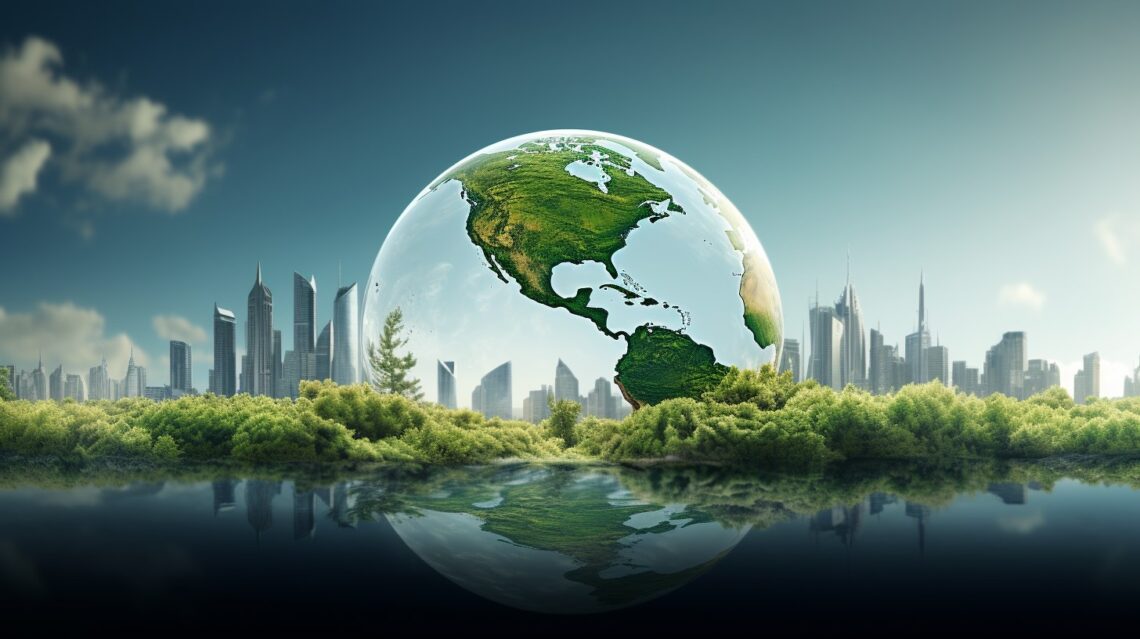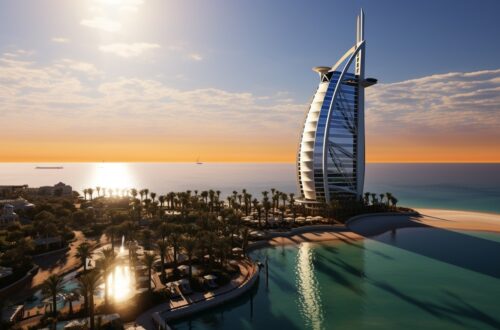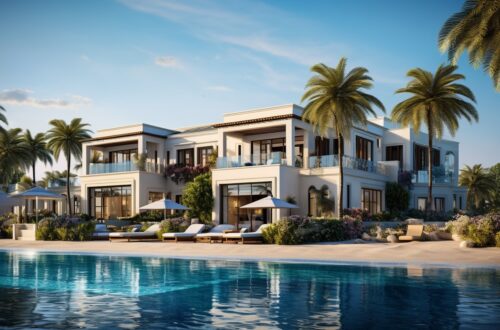Introduction to Carbon Reduction in Dubai’s Urban Development
As global cities increasingly focus on sustainability, Dubai has emerged as a leader in reducing the urban carbon footprint. The city’s transformation, characterized by its rapid growth and iconic skyline, now includes a strong commitment to environmental responsibility. This commitment is evident in a range of initiatives, from green building codes to large-scale renewable energy projects, all designed to mitigate the effects of urban development on the environment. For a city in a desert, these initiatives are not just about adhering to global standards but are crucial for the city’s future sustainability and habitability.
Green Building Standards and Regulations
Implementation of Dubai’s Green Building Codes
Dubai has implemented rigorous green building codes to make the city more sustainable. These regulations require new buildings to incorporate energy-saving features, efficient water use, and sustainable construction materials. The Dubai Green Building Regulations and Specifications, introduced in 2014, mandate improved insulation, solar water heaters, and energy-efficient lighting. These standards are applied to residential buildings and commercial and hospitality projects, ensuring a city-wide approach to sustainability.
The Impact of Regulations on New Developments and Retrofits
The impact of these regulations is profound. New buildings in Dubai are now models of energy efficiency, significantly reducing the city’s overall carbon footprint. For instance, retrofitting existing buildings to meet these standards has become a significant initiative. The Etihad ESCO project, for example, aims to retrofit over 30,000 buildings in Dubai to reduce energy consumption. These efforts contribute to reducing carbon emissions and result in considerable cost savings over time.
Major Sustainable Infrastructure Projects
In its bid to become a sustainable city, Dubai has embarked on several large-scale infrastructure projects that exemplify its commitment to reducing carbon emissions.
Case Study: The Sustainable City
The Sustainable City in Dubai is a pioneering development designed as a fully integrated green community. This development prioritizes environmental sustainability, featuring solar-powered homes, biodome greenhouses for urban farming, and a car-free residential area. It is a living example of how urban developments can positively affect the environment. The Sustainable City offers a sustainable lifestyle for its residents and serves as a tourist attraction, showcasing innovative solutions to urban environmental challenges. Visitors can explore this eco-friendly community to see sustainable living in action. More information about The Sustainable City and its features can be found here.
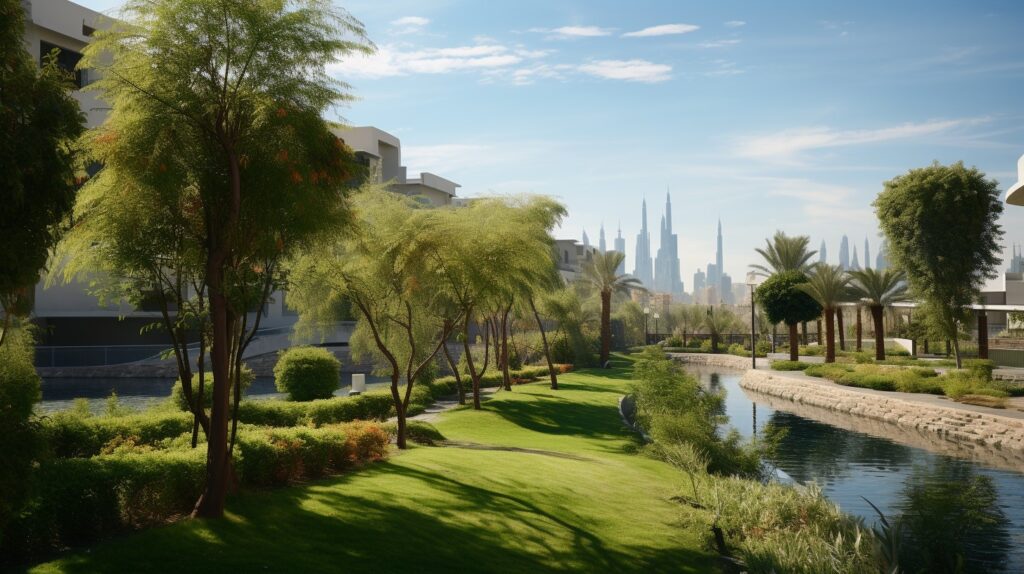
Case Study: Mohammed bin Rashid Al Maktoum Solar Park
Another landmark project is the Mohammed bin Rashid Al Maktoum Solar Park, one of the world’s most significant renewable energy projects. This solar park is a critical component of Dubai’s strategy to increase the use of clean energy. Once completed, it is expected to reduce over 6.5 million tons of carbon emissions annually. The solar park is not just a power generation facility but a symbol of Dubai’s commitment to sustainable energy.
From implementing green building codes to establishing landmark projects like The Sustainable City and Mohammed bin Rashid Al Maktoum Solar Park, Dubai is demonstrating that sustainable urban living is not only possible but also practical and beneficial. As a tourist or resident, witnessing these green initiatives provides a glimpse into a future where urban development and environmental responsibility coexist harmoniously.
Innovative Transportation Solutions
In the quest to reduce its carbon footprint, Dubai has recognized the crucial role of transportation in sustainable urban development. The city has been implementing innovative solutions to revolutionize mobility and reduce emissions from the transportation sector.
Expansion of Dubai’s Public Transportation Network
Dubai’s public transportation network has seen significant expansion and modernization. The Dubai Metro, one of the world’s most advanced urban rail systems, is a cornerstone of this effort. It offers a fast, efficient, and eco-friendly alternative to private vehicles. The metro system, including the Red and Green lines, covers key city areas and continuously expands. The introduction of the Route 2020 project, extending the Red Line, further enhances the network’s reach, providing more accessible access to the Expo 2020 site and other developments.
Moreover, Dubai’s public bus system has been upgraded by introducing energy-efficient and electric buses. These buses contribute to reducing emissions and improving air quality in the city. Integrating different modes of public transport and the development of pedestrian-friendly infrastructure encourages residents and tourists to opt for more sustainable travel options.
Promotion of Electric and Hybrid Vehicles
Dubai is actively promoting using electric and hybrid vehicles as part of its strategy to lower transportation-related emissions. The city has been installing electric vehicle (EV) charging stations across the city to facilitate the adoption of EVs. Incentives such as free parking and exemptions from registration fees are also offered to EV owners.
The Dubai Taxi Corporation has added hybrid and electric vehicles to its fleet, setting an example for the private sector. These initiatives contribute to reducing carbon emissions and position Dubai as a city committed to embracing clean and sustainable technology in transportation.
Energy Efficiency and Renewable Energy Integration
Dubai’s approach to reducing its carbon footprint extends beyond transportation to include the integration of energy efficiency and renewable energy in its urban development projects.
Integration of Solar Energy in Urban Projects
Incorporating solar energy into urban development is critical to Dubai’s strategy. The city’s building regulations now encourage installing photovoltaic panels on rooftops to generate clean energy. Residential and commercial buildings across Dubai are increasingly harnessing solar power, contributing to the city’s energy needs and reducing reliance on fossil fuels.
Projects like the Shams Dubai initiative by the Dubai Electricity and Water Authority (DEWA) encourage building owners to install solar panels and connect them to the power grid. This initiative not only promotes the use of renewable energy but also allows consumers to reduce their energy bills.
Energy-Efficient Building Designs and Smart City Technologies
Energy-efficient building design is another crucial aspect of Dubai’s sustainable urban development. New buildings must meet high energy efficiency standards, incorporating efficient insulation, LED lighting, and intelligent air conditioning and lighting systems controls. These features significantly reduce energy consumption and carbon emissions.
Furthermore, Dubai is embracing innovative city technologies to enhance energy efficiency. Smart grids, automated energy management systems, and advanced water-saving technologies are being integrated into the city’s infrastructure. These technologies contribute to energy savings and enhance the overall quality of life by making the city more efficient and sustainable.
Dubai’s initiatives in innovative transportation solutions and the integration of energy efficiency and renewable energy demonstrate the city’s multifaceted approach to reducing its carbon footprint. Expanding the public transportation network, promoting electric and hybrid vehicles, incorporating solar energy, and adopting energy-efficient building designs are all testament to Dubai’s commitment to sustainable urban development. These initiatives offer tourists and residents a glimpse into a future where urban living is harmonized with environmental sustainability. The final sections of this article will explore Dubai’s community engagement and public awareness strategies, as well as the challenges and future prospects in its journey towards a low-carbon urban environment.
Community Engagement and Public Awareness
Dubai’s strategy to reduce its carbon footprint extends beyond infrastructure and policy to encompass community engagement and public awareness. These initiatives are crucial to fostering a culture of sustainability among residents and visitors, ensuring that the community embraces and advances the city’s environmental goals.
Educational Programs and Community Initiatives
The Dubai government has initiated various educational programs and community initiatives to raise awareness about sustainability and encourage environmentally responsible behavior. These programs target a broad audience, ranging from school children to corporate entities, ensuring that every segment of society contributes to the city’s sustainability goals.
Schools in Dubai, for instance, have incorporated environmental education into their curricula, educating students about the importance of energy conservation, recycling, and other sustainable practices. This early education is crucial in cultivating a future generation conscious of environmental issues and committed to sustainable living.
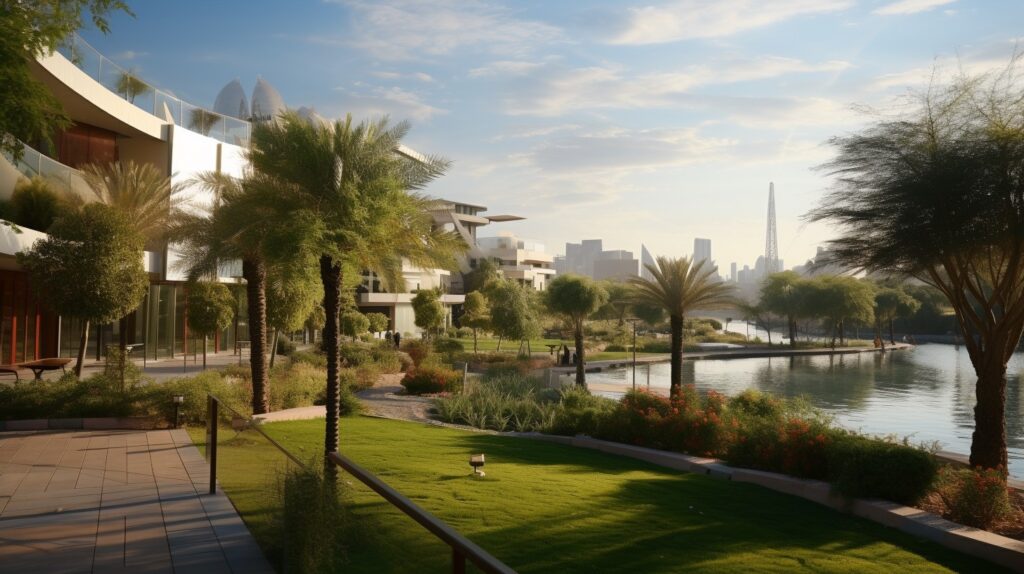
Community initiatives like the ‘My City, My Environment’ program, implemented by Dubai Municipality, involve residents in recycling efforts by providing them with recycling bins and educational materials. Such initiatives facilitate sustainable practices and instill a sense of environmental responsibility among community members.
Encouraging Sustainable Practices Among Residents and Businesses
Dubai has also been proactive in encouraging sustainable practices among residents and businesses. The government offers incentives for adopting green practices, such as reduced utility rates for buildings that achieve high levels of energy efficiency or use renewable energy sources.
Businesses in Dubai are increasingly adopting sustainability as a core part of their operations. Initiatives such as the Dubai Chamber of Commerce and Industry’s CSR Label reward companies for their sustainable practices, encouraging a shift towards environmental responsibility in the corporate sector.
Challenges and Future Prospects
Despite the significant strides made, Dubai faces ongoing challenges in reducing its urban carbon footprint. Balancing rapid urban development with environmental sustainability, adapting to technological advancements, and ensuring community participation are some hurdles the city continues to navigate.
Balancing Rapid Development with Carbon Reduction Goals
One of the primary challenges for Dubai is balancing its ambitious urban development plans with its carbon reduction goals. The city’s skyline constantly evolves, with new buildings and projects emerging rapidly. Ensuring this development adheres to sustainability standards without hindering economic growth requires careful planning and coordination.
Anticipating and Adapting to Technological Advances
As technology evolves, Dubai must stay ahead in adopting new and more efficient sustainability solutions. This includes staying abreast of advancements in renewable energy, innovative city technologies, and green building practices. Adapting these technologies to the local context and integrating them into the existing urban fabric is essential for continued progress in sustainability.
Dubai’s Vision for a Sustainable and Low-Carbon Future
Dubai’s vision for a sustainable and low-carbon future is ambitious and promising. The city is poised to continue as a leader in sustainable urban development. It plans to expand its renewable energy projects, enhance public transportation, and implement stringent green building codes.
Dubai’s commitment to sustainability is expected to reduce its carbon footprint and improve its residents’ overall quality of life. The city’s efforts in this direction will likely inspire other cities in the region and around the world to adopt similar measures.
Dubai’s initiatives for reducing its carbon footprint in urban development through community engagement, public awareness, and the careful balancing of development with sustainability showcase a city that prepares for the future and leads the way in sustainable urban living. For those visiting or residing in Dubai, these efforts provide a glimpse into a future where urban development and environmental responsibility go hand in hand, creating a vibrant and sustainable city.
